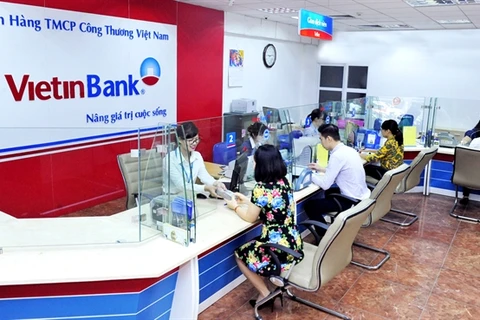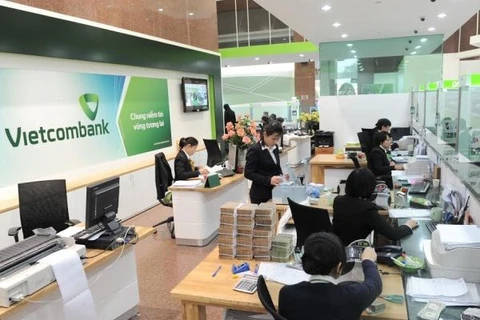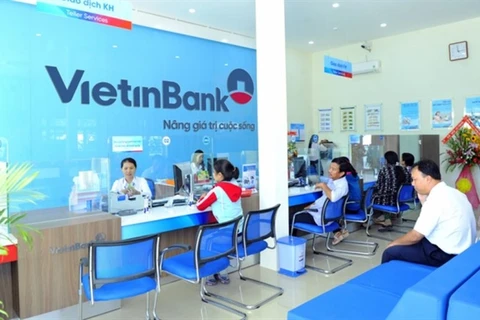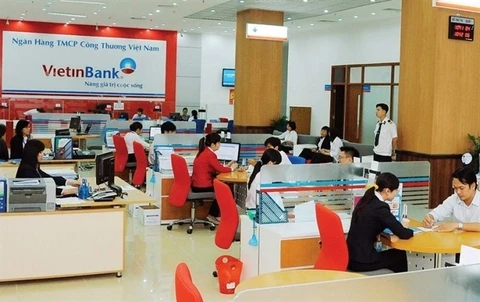Hanoi (VNA) – While private joint stock banks have had some success in raising their charter capital, major banks, except for Vietcombank, are still struggling with this work.
The State Bank of Vietnam (SBV)’s Circular 41/2016/TT-NHNN, which stipulates the capital adequacy ratio (CAR) of banks and branches of foreign banks, has worried many banks, and increasing capital in banks, especially State-owned ones, has never been so urgent.
Gap among banks widening
To promote the transparency of banks’ operations, since February 2016, the SBV has piloted the application of Basel II standards at 10 banks, namely Vietcombank, VietinBank, BIDV, MB, Sacombank, ACB, Techcombank, VPBank, VIB and MSB, and they must complete this work by the end of 2018.
Basel II is the second edition of the Basel Accords, which are recommendations on banking laws and regulations issued by the Basel Committee on banking supervision. Basel II, which comprises minimum capital requirements, supervisory review and market discipline, aims to enhance competition and transparency in the banking system and make banks more resistant to changes.
However, due to difficulty capital raising, the deadline for these banks’ application was extended to the end of 2019.
So far, the central bank has recognised seven of the 10 abovementioned banks meeting Basel II standards, namely Vietcombank, VIB, ACB, VPBank, MB, Techcombank and MSB. TPBank and OCB, which are not in the pilot scheme, have also received the central bank’s recognition.
VIB Director General Han Ngoc Vu said to receive the SBV’s permission to apply Basel II standards, VIB had to satisfy requirements relevant to information technology infrastructure, the risk management policy system, database, personnel and capital plan. The successful application of these standards has helped his bank build good business strategies and policies to optimise capital and risk-weighted assets.
Meanwhile, although TPBank is not included in the pilot scheme, it has met Basel II standards since May 1.
TPBank Director General Nguyen Hung said before the central bank issued the roadmap for Basel II application, his bank built a strict risk governance mechanism. Making the internal risk governance mechanism helped it soon meet capital adequacy ratio requirements and Basel II standards.
“Meeting Basel II standards will give TPBank more advantages in implementing new business models and providing many conveniences to clients,” he emphasised.
There are only six months left for the three remaining banks, BIDV, VietinBank and Agribank, to apply these standards.
An SBV leader said although there are only three remaining banks, they have a big combined asset value that accounts for more than 30 percent of the whole system’s total asset value. Therefore, the fact that these three banks haven’t been able to raise their capital is a major concern for the sector.
By meeting Basel II standards, the banks will have the restriction on their credit growth eased since they have ensured safety, risk governance and information transparency.
At the beginning of this year, while other banks were given a credit growth limit of 14 – 15 percent, the ceiling for VIB, TPBank and MB was raised to 20 percent. Meanwhile, though Vietcombank and OCB already met Basel II standards, they set their credit growth target at only 15 percent, just slightly higher than average.
Many banks asking for help
VietinBank and BIDV are in urgent need of increasing their capital to improve capital adequacy ratio.
BIDV recently found a strategic shareholder, KEB Hana – a bank from the Republic of Korea, to issue separately 15 percent of its charter capital. As there remain several obstacles, Chairman of BIDV’s Board of Directors Phan Duc Tu proposed the restrictions on foreign investors be removed so the bank can complete the sale of its capital as soon as possible.
Meanwhile, VietinBank is still grappling to seek a solution. It hasn’t had its charter capital increased since 2014 and is now the bank with the slowest progress in raising charter capital among State-owned commercial banks. VietinBank posted a credit growth rate of only 6 percent in 2018, the slowest place of this bank in more than 10 years.
The bank hasn’t recorded credit expansion since the beginning of this year, greatly affecting its ability to meet enterprises’ capital demand as well as its business performance.
“Therefore, how to raise capital is an urgent need and also the most difficult task of VietinBank in 2014-2019, which will directly impact its business outcomes. Low credit growth due to capital limits will influence the bank’s satisfaction of capital demand in the economy and its participation in funding important projects of the country, which will subsequently affect economic growth and State budget revenue,” said Chairman of VietinBank’s Board of Directors Le Duc Tho.
For Agribank, slow equitisation has made it the bank with the smallest charter capital, about 30.77 trillion VND (1.32 billion USD), among the four biggest State-owned commercial banks.
Chairman of Agribank’s Members Council Trinh Ngoc Khanh stressed that: “If its charter capital is not increased in 2019, the bank will be unable to meet the minimum capital adequacy ratio. Additionally, that will affect its prestige and ability to supply credit to the economy.”
The capital hike of this bank is closely associated with equitisation, a process that is also facing numerous difficulties, particularly business valuation. Khanh added Agribank is the last bank fully owned by the State to carry out equitisation, so seeking foreign partners will be hard.
Vietcombank may be the most confident bank because in early March, the SBV permitted this bank to raise its charter capital by 1.1 trillion VND to more than 37 trillion VND after Mizuho of Japan purchased more shares to maintain its ownership rate of 15 percent of the bank’s charter capital and GIC of Singapore bought 2.55 percent of this bank’s shares in late 2018.
This is just part of the capital raising scheme that Vietcombank has planned for many years. This bank is set to continue increasing its capital in the time ahead. -VNA


























